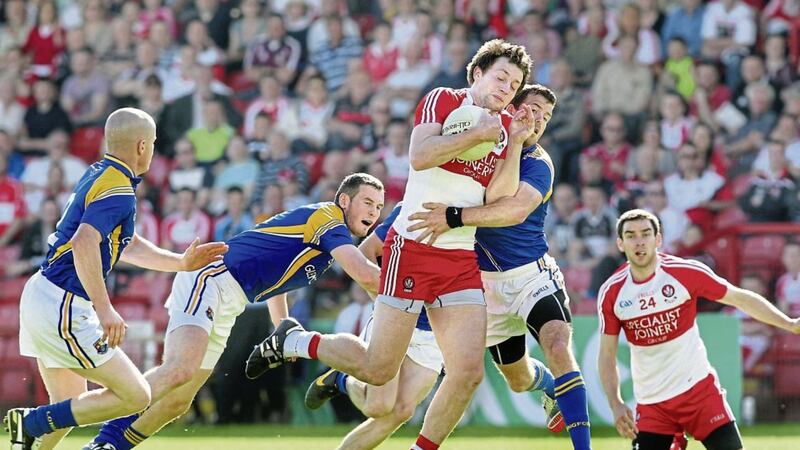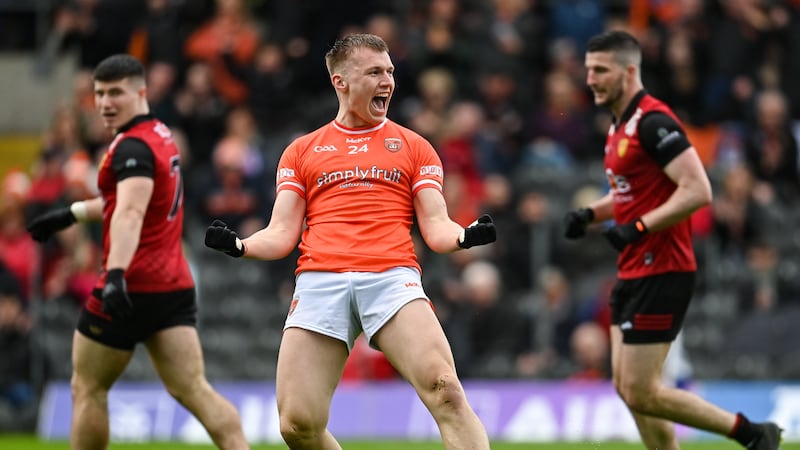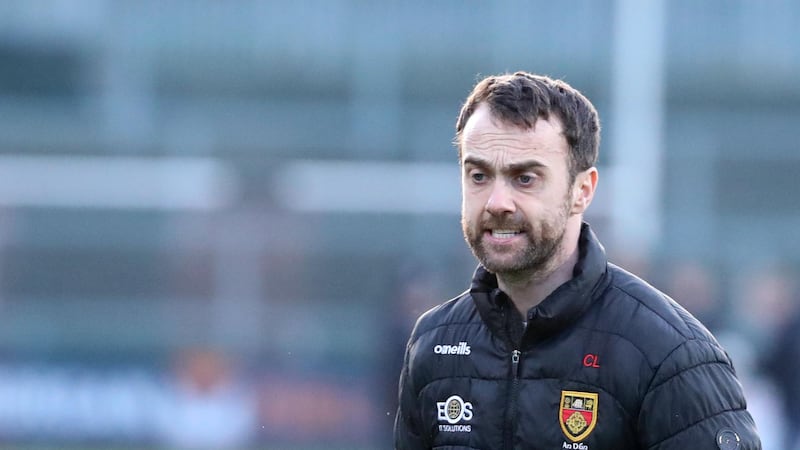Where they started the decade
WITH a reputation to uphold. There was seldom a championship that went past in the 1990s and 2000s that didn’t involve some pundit tipping Derry as a dark horse. The county’s ability to continually produce top-end footballers from a shallow pool engaged outsiders, who would usually follow their praise with ‘if the clubs would only stop killing each other’.
Truth is, and always was, that it was never on-field violence in club games that held Derry back.
That was, and always has been, a mythological beast.
Damian Cassidy’s reign at the beginning of the decade didn’t go to plan. He’d taken over in 2009 with a promise to put pride back in the geansai, but a humbling home hammering to eventual All-Ireland semi-finalist Kildare brought a sobering end.
John Brennan took over. His fire and brimstone approach dovetailed nicely with a kind draw that smoothed the path to a first Ulster final in 11 years in 2011.
Yet it was with a very different team to the one that upheld the reputation for ability and regenerated the questions over why it wouldn’t click in the years previous.
Even by then, Gillis, McCloy, McFlynn and McBride were all disappeared off the teamsheet, and there was no Fergal Doherty or either of the Bradley brothers (albeit it both through unfortunate injuries) for that loss to Donegal.
It was a promising start to the decade of sorts, but it would prove to be a false dawn. The changed nature of the playing resources would become the theme of the ten years ahead.
They’d slipped out of Division One in 2010 and it would be four years before they would return, a factor that undoubtedly impacted a new team’s ability to grow.
Derry football was only a stone’s throw from the top table when the decade began, but would find itself trying to hurl rocks from a mile away as the years went on.
Changing managers
IS the fact that Derry are on their sixth manager since 2010 a scar left by the problem or a symptom of it? Many would contend that it’s the latter.
Brian McIver is the only man since Paddy Crozier in 2008 to make it to three seasons in charge, and the legacy of his reign has been shrouded by the latter part of it that didn’t go so well.
Ballinderry’s 2002 All-Ireland club winning boss had Derry playing some of the best football of a generation in the early part, steaming their way into Division One and eventually a league final, thanks to a remarkable win over Mayo with 14 men for most of the game.
But that 2014 final would change it all. Dublin handed out a whipping, Longford ended the championship campaign in a first round qualifier and the Oak Leaf side that emerged the following spring had a very different approach.
McIver’s final year didn’t go so well, but at least he’d gotten to three.
By the time John Brennan (2012), Damian Barton (2017) and Damian McErlain (2019) all ended their second terms in charge, a change seemed inevitable.
Brennan had reached an Ulster final with basically a new team but they’d completely crumbled in 2012 and were beaten out the gate in Ballybofey before also succumbing to Longford.
Barton and McErlain were mired in a transitional phase that saw the team plummet like a stone to Division Four of the Allianz Leagues for the 2019 season, a remarkable drop in such a short space of time.
McErlain came straight in from doing a great job on the county’s minor teams but only saw out two of his three-year term, stepping away at the end of that second season having restored some pride.
Rory Gallagher took the reins but hasn’t had a proper run at it yet.
Changing captains
CLIMBING steps and writing speeches have been rare perks of the job in the last decade.
Mark Lynch lifted the Division Two title as skipper in 2013, while Chrissy McKaigue sheepishly lifted the Division Four silverware in 2019, his manner underlining the sense that Derry were just glad to get out as quickly as possible.
That’s been about the height of it. It was Kevin McCloy who lifted a rare McKenna Cup in 2011, though the season’s captain who would lead them out in the Ulster final that July was actually Barry McGoldrick.
The Coleraine man would lead the band around St Tiernach’s Park but little did it appear that as they trudged off beaten by Donegal, the trajectory of the two counties would take off in such different directions from there.
Paddy Bradley was rewarded with the captaincy in 2012 after making his recovery from a cruciate injury, but that was to prove the final outing as Brian McIver didn’t pick him upon taking over.
Mark Lynch became his skipper for the whole three years of his reign and would be the team’s spiritual leader right up until his retirement.
Chrissy McKaigue (2016, 2019 and 2020) and Enda Lynn (2017 and 2018) have since shared the captaincy, although the latter will not be part of Rory Gallagher’s plans for 2021.
How they stand now
DESPERATE for a sign of progress at senior level.
A run of four consecutive Ulster minor finals between 2015 and 2018, winning two, was the first fledgling sign of a recovery at inter-county level in a generation.
Prior to the 2015 success, in which they stunned Donegal at the semi-final stage, it had been 13 years since Derry had won a provincial minor title and seven years since they’d been in a final.
With the exception of Conor Glass, whose return from Australia should be a huge boost once he settles back into Gaelic football, the minor teams were largely functional, well-rounded units without any galaxy of obvious future stars.
As such, it’s taking a while to bleed. The team that faced Armagh in last year’s championship contained just four exports from those teams, the eldest crop of which would be turning 24 this year. Of those four, Ethan Doherty jumped the queue, making his debut just out of school.
Granted, Michael McEvoy, Jack Doherty and Shea Downey might all have added to that tally had they been fit, but it’s a sign that a bit like Cavan’s U21 successes that took nearly a decade to bear fruit, there will have to be patience exercised.
Shane McGuigan and Niall Loughlin have the making of a dangerous two-footed inside forward line with a bit of gametime together, while Ciaran McFaul has developed into a real leader.
Defensively, though, the inconsistency in personnel has told in recent years. It’s part of why Rory Gallagher seemed like the right choice. If he can leave them as a better unit in that regard, it would be a start.
Success looks a bit down the line yet.
How will they fare in 2021?
NOT that Covid has done anyone any good, but in terms of any project Rory Gallagher had in mind, the ability to make progress with a young Derry team has been severely stunted.
They missed out on promotion out of Division Three last year, with the damage effectively done by losing a one-point game to Down that Derry would still feel they should have won.
The straight knockout championship presented an opportunity that they almost took. Armagh’s championship record has been weak in Ulster and they only just scraped out.
But having missed out on promotion, with just one championship game behind them and now being turfed into a tricky league section with provincial champions Cavan, Fermanagh and Longford, they will likely prioritise promotion above all else.
The championship draw hasn’t been overly kind of late and the prospect of Donegal in Ballybofey fits the same bill. They’d much prefer Down emerge from the preliminary round and have to come to Celtic Park.
With the winners of Tyrone and Cavan on the same side of the draw, it’s yet another uphill task.
Top scorer in 2020
NOT really since Paddy Bradley departed the scene have Derry had a single reliable source of scores. That has threatened to finally change over the last 18 months with the emergence of Shane McGuigan. The team has yet to learn how quite to get the best out of the Slaughtneil man, but his development of a good right foot to go with his brilliant left has propelled him to a new level. A reliable free-taker from the hands, the 23-year-old has his best days ahead.
Players gone
THERE have been so many ins and outs that the revolving door would have needed to be on full power to hit half of them on the ass as they left.
One of the most significant problems Derry have had in a disappointing decade has been the inability to retain players for any considerable period of time.
The team of the noughties was already moving on by the time John Brennan took them to the Ulster final in 2011. By the time Brian McIver took them to a league final in 2014, it felt like a completely new team again. The same then when they started to tumble through the leagues, dropping into Division Four with a barely recognisable team.
Veterans were in short supply. Once the likes of Enda Muldoon, Fergal Doherty, Kevins McGuckin and McCloy exited stage left, Mark Lynch became the team’s central figure and was a huge loss when he retired at the end of 2018.
His experience and likeability had been really holding things together through a testing period. When he went, almost the whole weight fell on the shoulders of Chrissy McKaigue.
There were the likes of Sean Leo and Barry McGoldrick, the latter captain in 2011 and the former arguably the team’s most consistent player for a spell in the middle of the decade. Gerard O’Kane had gone perhaps earlier than expected, while Dermot McBride was as good a man-marker as was in Ulster for a spell that was all-too brief.
Players introduced
SINCE 2008, Derry have used 118 different players in championship football. Where do you begin to introduce them?
There have been those who have made a good impact, just not for as long as would have been liked. Danny Heavron springs to mind, quickly establishing himself to the point where he was easily the county’s best player over a couple of seasons.
Gareth McKinless, Lee Kennedy, Ryan Bell, Declan Mullan all spring to mind as though who had the raw materials and produced glimpses of it. Kennedy threatened to be a real baller under Brian McIver, a two-footed, lively inside forward who found his scoring feet, but he emigrated.
Rory Gallagher gave out as many as eight championship debuts against Armagh last year. Damian McErlain gave 10 in his two seasons. Barton, 13. Brian McIver, 22. John Brennan, 15. Remarkable numbers that ensure you get the picture fairly quickly.
Chrissy McKaigue’s been a rare ever-present since his arrival back from Australia, while former captain Enda Lynn carved out a consistency that earned him some kudos, albeit not enough to avoid Rory Gallagher’s cull in the post-season.








